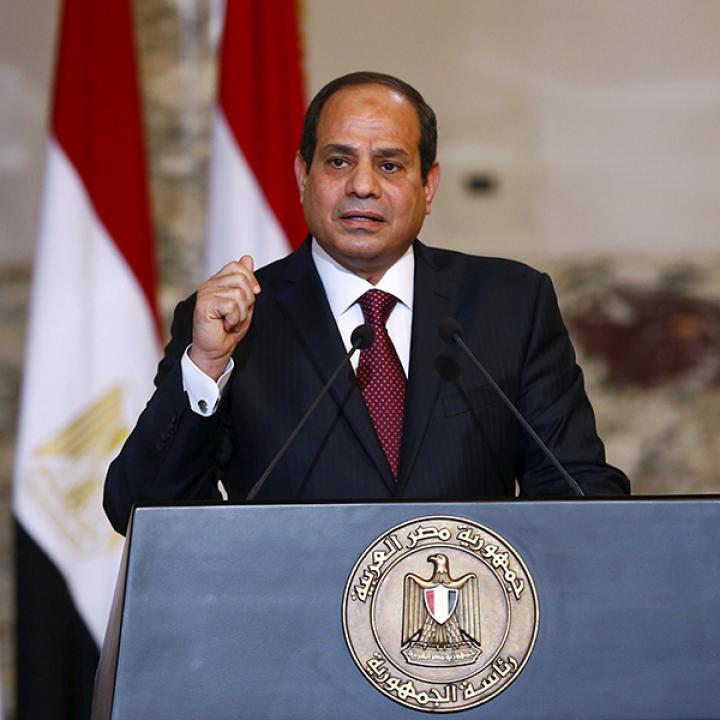

January 24, 2018
As his current term nears its end, Egyptian president Abdul Fattah al-Sisi is preparing to run in Egypt’s upcoming presidential election, set for three days beginning on March 26.
Sisi derives his legitimacy in ruling Egypt from his overthrow of Islamist President Mohamed Morsi in June 2013 and his crackdown on the Muslim Brotherhood (MB) and political Islam groups, as well as the Egyptian army’s war on terrorism in North Sinai.
As the defense minister at the time, Sisi urged the Egyptian people to take to the streets in mass protests. Thus, the 2014 election became a matter of form, passing without any real electoral challenge. On the other hand, the upcoming presidential election comes amid a broader state of dismay over the deteriorating economic, security and political situation.
Under Sisi’s rule, the Egyptian economy has witnessed a sharp and rapid decline, which foreshadows a total collapse due to mismanagement. This deterioration has been evident in the Egyptian pound’s crash against the dollar, the increasing inflation and unemployment, and the subsidy cuts for fuel, energy, and basic consumer goods.
Sisi had previously promised the Egyptian people that the economic crisis would end in two years, and that all citizens would enjoy prosperity. He had found a temporary solution through loans from the International Monetary Fund (IMF) and a number of international institutions and donor countries to cover the government’s growing budget deficit, which is expected to reach 370 billion Egyptian pounds, about 10.9 percent of the budget). Meanwhile, the most serious and alarming economic indicator is the increasing foreign debt, which has reached $79 billion.
These indicators are reflected in the living conditions of Egyptian families, which have been expressing their discontent with Sisi’s economic performance, as they had to bear the brunt of the economic situation after two years of promises.
Nonetheless, in 2018, Sisi hopes the floating of the Egyptian pound will translate into increasing exports, while continuing pressure on Russia to restore tourism in South Sinai and Red Sea resorts, which would revive an ailing tourism sector after the Islamic State brought down a Russian airliner in 2015.
In terms of security, the terrorist attacks carried out by armed extremist groups have not been limited to North Sinai, but have extended to the Nile Valley and Cairo itself. In 2017, terrorist attacks targeted civilians at churches in Tanta and Alexandria as well as at the al-Rawda mosque in North Sinai, where more than 300 unarmed civilians were killed.
The Islamic State threatened senior state officials by targeting the helicopter that carried Defense Minister Sedky Sobhy and Interior Minister Magdy Abdel Ghaffar to Arish airport, killing the defense minister’s office manager. Thus, the widening geographical scope of terrorist attacks has come to reflect a significant failure of the Sisi regime’s management of the war on terrorism, on which he has based his legitimacy as president in this period of the country’s history.
Politically, as the election approaches, there were some challenges ahead of Sisi emerging from within his own regime. They include the emergence of Sami Anan as strong competitors for the presidency. However, Sisi’s regime does not tolerate opposition and in less than two weeks from his announcement of his candidacy, Anan was arrested on charges of incitement against the armed forces and forging documents pertinent to the formal end of his “active service.” Such charges seem to be a calculated move to force out Anan as the last potentially serious rival of Sisi after getting rid of previous potential candidate Ahmed Shafiq, who was put under house arrest and subsequently withdrew from the election.
The emergence of both Anan and Shafiq as key rivals for Sisi in the upcoming election reflects a rift within the regime. That rift is evidenced by the sacking of General Intelligence Service (GIS) director Khaled Fawzi and his replacement by Gen. Abbas Kamel. Analysts believe that the removal of Fawzi can be attributed to Sisi's suspicion that there is a connection between the GIS and Anan's and Shafiq’s candidacies.
Other potential presidential candidates included leftist politician Khaled Ali, one of the lawyers defending the Red Sea islands case in opposition to the government's stance, which defended the transferring the islands of Tiran and Sanafir to Saudi Arabia. However, the popularity that Ali acquired from his stance on this case was not sufficient to enable him to pose a serious a challenge to Sisi. Therefore, following the regime’s handling of the other presidential candidates, Ali withdrew from the race on January 24. Ali's withdrawal will make Sisi the sole candidate.
To sum up, the deterioration of the security, economic, and political conditions over the past four years has led to the erosion of the legitimacy of Sisi’s regime. Nonetheless, Sisi continues to control the state’s security and military institutions, making competition against him practically impossible.


